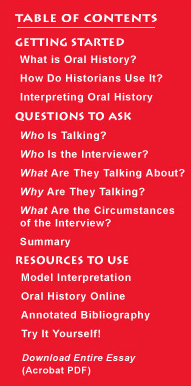
To evaluate
an oral history interview, consider the following:
1. Who
is the narrator?
What is the narrator's relationship to the events under discussion?
What stake might the narrator have in presenting a particular version
of events?
What effect might the narrator's social identity and position have on
the interview?
How does the narrator present himself or herself in the interview?
What sort of character does the narrator become in the interview?
What influences--personal, cultural, social--might shape the way the
narrator expresses himself or herself?
Consider especially how the events under discussion are generally regarded
and how popular culture might shape the narrator's account.
2. Who
is the interviewer?
What background and interests does the interviewer bring to the topic
of the interview?
How might this affect the interview?
How do the interviewer's questions shape the story told?
Has the interviewer prepared for the interview?
How adept is the interviewer in getting the narrator to tell his/her
story in his/her own way?
What effect might the interviewer's social identity and position have
on the interviewee, and hence the interview?
How might the dynamic between narrator and interviewer affect what is
said in the interview?
Does the interviewer have a prior relationship with the interviewee?
How might this affect the interview?
3. What
has been said in the interview?
How has the narrator structured the interview?
What's the plot of the story?
What does this tell us about the way the narrator thinks about his/her
experience?
What motifs, images, anecdotes does the narrator use to encapsulate
experience?
What can this tell us about how the narrator thinks about his/her experience?
What does the narrator avoid or sidestep?
What topics does the narrator especially warm to, or speak about with
interest, enthusiasm, or conviction?
What might this tell us?
Are there times when the narrator doesn't seem to answer the question
posed?
What might be the reason for this?
Are there significant factual errors in the narrative?
Is it internally consistent?
How might you account for errors and inconsistencies?
How does the narrator's account jibe with other sources, other interviews?
How can you explain any discrepancies?
4. For
what purpose has this interview been conducted?
How might the purpose have shaped the content, perspective, and tone
of the interview?
5. What
are the circumstances of the interview?
What effect might the location of the interview have had on what was
said in the interview?
If anyone other than the interviewer and interviewee were present, what
effect might the presence of this other person have had on the interview?
Do you know the mental and physical health of the narrator and interviewer?
What effect might these have had on the interview?



